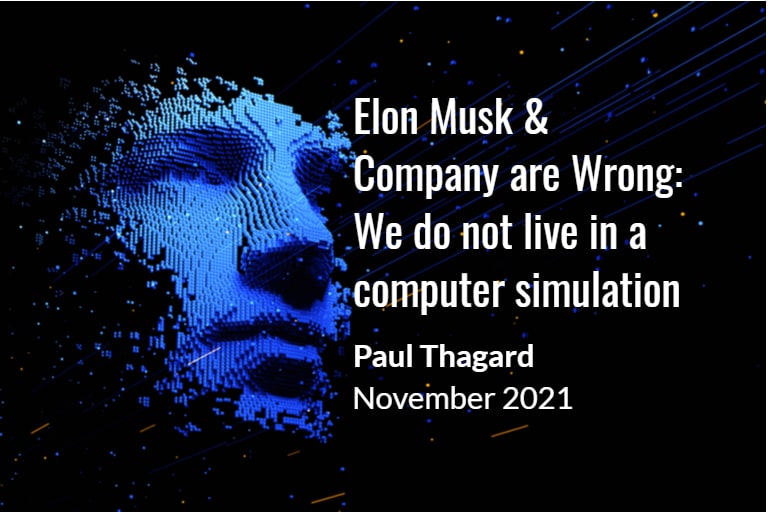By Paul Thagard, Distinguished Professor Emeritus of Philosophy, University of Waterloo
Elon Musk and others find it plausible that our experiences result from events in a computer simulation, just like the characters in the Matrix movies. An alternative view, supported by both common sense and scientific evidence, is that our experiences result from the mental processing of interactions with the real world. Here are five reasons why the real-world hypothesis is much more plausible than the simulation hypothesis.
1. There is no evidence for the simulation hypothesis.
Hypotheses are evaluated by how well they explain good evidence and how well they fit with other well-supported hypotheses. There are no observations explained by the simulation hypothesis that are not more solidly explained by real-world interactions. For example, right now I am listening to a song I like on Apple Music, which is explained by my brain processing sounds that reach my ears because my computer speakers generate sounds by accessing Apple music. The simulation hypothesis explains no new facts that count against the real-world hypothesis.
2. The simulation hypothesis requires unfounded extra assumptions about the origin of the computer program that simulates you.
Theories are supposed to be simple in having a small number of hypotheses that explain evidence without a lot of extra assumptions. Unlike the real-world hypothesis, the simulation hypothesis assumes that there is a computer simulation that is generating your experiences. Who produced the computer simulation that you are supposed to be in? It can’t be any current computer because none has the bandwidth and algorithmic complexity to generate your huge variety of experiences. It could be some future computer powerful enough to simulate past individuals, making you think that you are living in 2021 when you are actually being simulated in some future year such as 3021. But we have no independent evidence that such computers will eventually exist. Another possibility is that you are a simulation performed by space aliens, but we have no evidence that there is other intelligent life anywhere in the universe. Intelligent life on earth may well be a fluke because it required improbable non-repeated events such as the origin of energy-efficient eukaryotic cells which happened only once around two billion years ago.
3. Mathematical arguments for the simulation hypothesis are defective.
Bostrom (2003) claims that future civilizations will have enormous computer power to run hugely many simulations of their ancestors. If this is true and if people are motivated to produce such simulations, then it might be that one of those simulations is a simulation of you. However, I think it is much more plausible that humans will encounter limits to computer power, as Moore’s law is already limited by subatomic restrictions. Given climate change, epidemics, and international conflicts, it is unlikely that humans will survive long enough to enjoy such computing power. Moreover, we have no reason to expect that future computer simulations would get around to simulating you, especially when limited by energy constraints.
The abstract arguments that we are living in a computer simulation assume that in the future there will be a vast number of simulations, which is challenged by limits of hardware, software, and energy. Hardware limits concern the decline of Moore’s law, software limits concern the computational complexity that makes even the largest computers incapable of dealing with exponential growth, and energy limits concern the power needed to run all the computers. Even solar energy is not unlimited. We already know from Bitcoin and training computers for deep learning that energy availability can put serious constraints on what can be computed.
Kipping (2020) purports to give a Bayesian analysis of the claim that we are living in a computer simulation, but he makes the dubious assumption that the number of simulations grows exponentially with each generation. We have no reason to believe that computer speed or the number of computers will grow exponentially, especially given the energy limitations discussed below.
4. Computer simulations are not conscious.
Bostrom’s argument assumes substrate independence, the doctrine that mental states can operate in a broad class of physical systems. This assumption is crucial to the argument because it is needed to support the claim that powerful computers will actually have experiences, not just simulate them.
Perhaps that will turn out to be true, but the general assumption is undermined by the following argument (Thagard, forthcoming):
- Real-world information processing depends on energy.
- Energy depends on material substrates.
- Therefore, information processing depends on material substrates.
- Therefore, substrate independence is false.
The steps in this argument are justified by examination of real-world cases of biological and computational information processing. Consciousness in humans may well depend on the energy profiles of biological mechanisms with neurons, glial cells, and mitochondria. So there is no reason to believe that even the most powerful simulations of humans minds, running on computers with electrical rather than biochemical energy sources, will actually be conscious. Just as a simulation of the weather is not windy or wet, a powerful computer simulation of you is unlikely to have your experiences. Computers might eventually acquire consciousness, but their different bodies, sensors, and processors would make this very different from human consciousness (Thagard and Stewart, 2014).
5. Ample evidence exists for the real-world hypothesis.
The hypothesis that you operate in the real universe rather than a computer simulation is part of a highly coherent set of beliefs that include the following.
- You have thousands of conscious experiences.
- Your experiences result from the operations of your brain through bodily interactions with the world via vision, hearing, touch, taste, smell, and other senses (Thagard 2021).
- Your body exists because your parents gave birth to you, and their bodies existed because of chains of parenting going back hundreds of thousands of years.
- Humans evolved from a primate precursor around 7 million years ago.
- Life evolved on Earth starting around 4 billion years ago.
- The universe is around 13.5 billion years ago.
These claims not only fit with each other but with vast amounts of well-established evidence. Therefore, you should not waste time on the unsubstantiated hypothesis that you are living in a computer simulation.
©Paul Thagard
Paul Thagard is a philosopher, cognitive scientist, and author of many interdisciplinary books. He is Distinguished Professor Emeritus of Philosophy at the University of Waterloo and a Fellow of the Royal Society of Canada, the Cognitive Science Society, and the Association for Psychological Science. The Canada Council awarded him a Molson Prize (2007) and a Killam Prize (2013). Paul Thagard’s Treatise on Mind and Society was published by Oxford University Press in February, 2019.
References
Bostrom, N. (2003). Are we living in a computer simulation? The Philosophical Quarterly, 53, 243-255.
Kipping, D. (2020). A Bayesian approach to the simulation argument. Universe, 2020, 6(8). 109.
Thagard, P. (forthcoming). Energy requirements undermine substrate independence and mind-body functionalism. Philosophy of Science.
Thagard, P. (2021). Bots and beasts: What makes machines, animals, and people smart? Cambridge, MA: MIT Press. October.
Thagard, P., & Stewart, T. C. (2014). Two theories of consciousness: Semantic pointer competition vs. information integration. Consciousness and Cognition, 30, 73-90.
Note: The views expressed in this article belong to the author, and do not reflect the position of Intellectual Dose, or iDose (its online publication). This article is republished from Psychology Today with permission.



